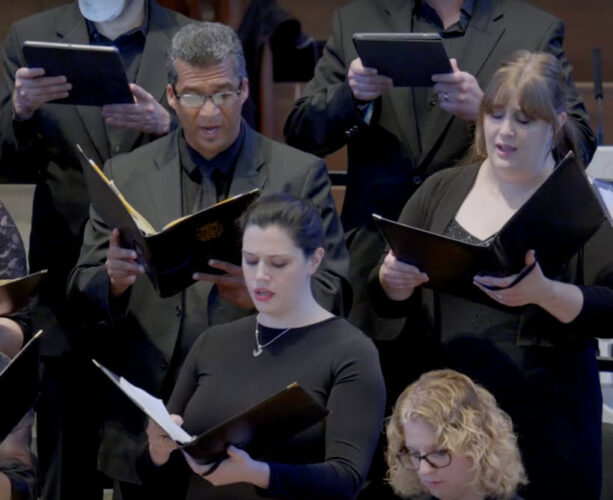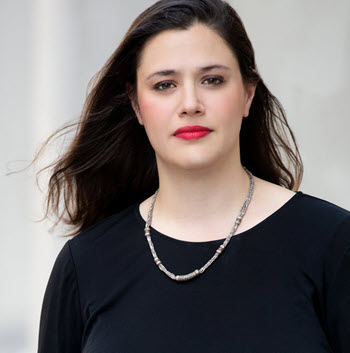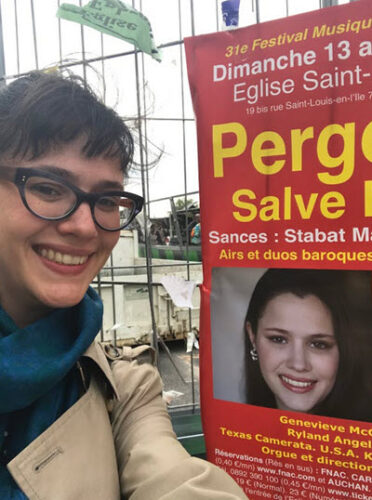It’s a question of identity: If you earn a living away from music, are you still a professional musician?

When the pandemic hit in March 2020, I was living in Charleston, S.C. and working in operations at a major international arts festival. At the time, I was living another iteration of my ongoing quest to continue singing professionally after graduate school while, crucially, having health insurance.
For as long as I’ve earned income outside of singing, I have felt torn about the dual aspects of my life — and whether or not to share them openly with others.
Part of me values the sense of financial stability, although it remained shaky for a long time and required changing jobs a few times. (Below the CEO and artistic director levels, arts administration often doesn’t compensate adequately.) I also value an increasingly stable sense of identity outside the highs and lows that come with being a performing musician, which often depend on the judgments of others; this was particularly true when I was younger and in a more vulnerable frame of mind.
Still, a loud voice in me wonders if colleagues, conductors, and the world at large see me as a less legitimate musician because of my dual identity. This was true when I worked for arts organizations, in a separate field still related to singing. It’s true in my current job involving DEI, where I often draw on my experiences in the arts — although explaining the thread linking the two now takes a bit more effort.

I often feel either a sense of shame or simply keep quiet about my decision to devote time and energy to professional development outside of performing. I worry, in part, that it might impact whether or not people will want to collaborate with me.
When COVID suddenly shut everything down, I felt the full force of these conflicting emotions as I heard from friends whose entire source of income had vanished overnight and who were now scrambling. My concern for them (and our industry as a whole) was coupled with a sense of alienation from my own artistic community. Since I wasn’t as directly impacted financially as some of my colleagues, I suddenly had a feeling of being on the outside looking in.
So I reached out to a group of friends and suggested we gather over Zoom to discuss common challenges, celebrate victories (however small), and support one another. One topic that came up quickly was the key issue of money and identity: What marks you as a professional singer?
We shared that earning money as a musician had become tied to whether or not we could claim the identity of a practicing artist. Gigs drying up was not only threatening from a financial standpoint; those who now had to consider finding other forms of income were experiencing a crisis around their vocation.
Starving artists, employed artists, trust-fund artists
My father is an economist. The connection between working in the arts and the day-to-day business of making a living has long been a topic of interest to me. There are countless examples of successful artists who held other jobs: Composer Charles Ives founded his own insurance company in 1906; poet T.S. Eliot worked as a bank teller; early-music pioneer Noah Greenberg supplemented his income as a music copyist by selling roofing materials; composer Philip Glass worked as a plumber and drove New York City taxi cabs well into his forties.
That’s not to mention the many musicians who have held other identities — including parent — while continuing to practice their art. Or those who received significant financial support from their spouse or their family that made it possible to pursue their creative dreams. Yet the enduring, romanticized image we have of artists seems drawn from the characters of La bohème, burning manuscripts to keep warm in cold garret apartments. (Although even that portrayal isn’t sincere. The opera’s hero, Rudolfo, is play-acting the poor artist: at one point he lets slip that he stands to inherit a fortune from his uncle.)
To explore this topic, I spoke with several colleagues — all singers involved with early music and historical performance — about their decisions and concerns regarding financial stability and artistic identity. I was especially curious to see how their experiences compared with mine.
A soprano I’ll call “J.” has been earning all of her income through singing for roughly eight years. She credits an early day job — as a nanny for her voice teacher — with giving her the flexibility to begin to pursue a singing career in earnest. “My voice teacher was essentially my boss. She would understand if I needed to rearrange the hours or take time off to perform a gig,” J. recalled.
Eventually, J., who is based in Baltimore, found steady income through a church singing job and was getting steady gigs. This was, understandably, an achievement she felt proud of: She’d figured out how to make a living as a professional chorister, without much guidance from schools or training programs.
She remembers thinking, “I’m bringing in a modest income but, at the same time, I was giving myself a pat on the back and saying, ‘I made it! I’m surviving off just my art!’”
Things changed when she and her partner, who also worked as a freelance singer, both got sick with COVID in 2020. J. was hospitalized and might have died if not for serious medical treatment. Recovery was especially rough, and J. soon learned she was dealing with long COVID. Although she had health insurance, her plan made it difficult to see specialists outside her network without high out-of-pocket expenses. (Healthcare that’s tied to employment is unique to the U.S. system; freelancers in other countries typically don’t encounter similar obstacles.)
With J.’s physical limitations, and public performances on hold indefinitely, she remembers that, at that moment, she “couldn’t see getting a job. It probably would have been in retail because I don’t feel like I have the résumé to be able to do something that could be remote work. I felt really bad, but I put the weight on [my partner’s] shoulders to go find a ‘real job.’”
‘I was giving myself a pat on the back and saying, I made it! I’m surviving off just my art!’
When I asked how that arrangement was working, J. shared that it had been “a double-edged sword.” She observed that her partner seems “more comfortable and more stable financially, of course, but he hasn’t been able to gig as much as he used to. He doesn’t have to take every [project] that comes his way, for example, with a conductor he knows is abusive. At the same time, he feels like he’s not as much of a real musician because he can’t perform as much.”
J. cautioned that her situation “is not as great as people may think. Of course, it’s great to have dual income, but we’re making probably combined $55K a year.” According to a 2022 Pew Charitable Trust study, this puts them below the threshold of a middle-class income in the Baltimore-D.C. metro area. “We’re struggling,” she said.
When she was in the process of a return to singing, after her long COVID diagnosis, J. had two interactions with conductors, one positive and one less so, that highlighted both the potential for support and the potential stigma that could come with admitting to a chronic health issue. One treated her like damaged goods; the other knew her condition and praised her artistry nevertheless.
The unpredictability of how her singing might be perceived by conductors (and people in charge of hiring decisions) set J. firmly on the path of finding work outside of performing: “I have admiration for people who have a job and still gig.” But she feels daunted, both by the “many hurdles” to getting there — for example, having to write a résumé for the first time in years. She also expressed concern whether there might be hidden costs to changing directions and finds it difficult to envision what things could look like on the other side. “I worry about ending up like [my partner] where I would have to turn down a lot of regular gigs,” she said.
“And I’m wondering how some of our colleagues have a job outside of performing and still travel to do gigs?”
Musicians can be reluctant to speak about having an outside job, particularly if it’s not teaching music or in arts administration. They feel the fear that “other people are not going to see you as a serious singer,” as one colleague put it. “And because no one really talks about it, it can feel like you’re the only one who’s conflicted about these choices. There’s a lot to unpack.”
‘Because no one really talks about it, it can feel like you’re the only one who’s conflicted about these choices.’
“L.” is a tenor who recently moved to the D.C. area from Tennessee and who has worked in hospitality to supplement gig income. He talked about how social media distorts our impression of what’s possible: He sees colleagues living a curiously carefree life devoted to their art but, eventually, “you get to a certain age where you realize, ‘Oh yeah, someone was definitely supporting them financially.’” Their glamorous social-media presence can take a toll on your self-esteem: “Sometimes you’re like, wait. Why can these people maintain a full-time music career and I can’t?” L. said. “I have a lot of feelings about it.”
For L., being paid to sing felt like an easy-to-understand marker that he’d “made it.” He hoped people from his hometown, in particular, would acknowledge this achievement. Growing up in a place where people didn’t understand what a music career could look like, he wanted to show that, “while it might not look to you all that I made it, or that singing is my job, it is. I really want them to see that.”
A desire for recognition is something that he’s beginning to move beyond, but he admitted that “it’s had a huge effect on my professional development.”
An artist who still works in the arts
By coincidence, while I was working on this article, a colleague shared with me that she was considering a full-time offer in arts administration and wanted to get my perspective.

“K.” viewed me as a model for someone who had been able to maintain a singing career while working a full-time job. But she wanted to know what that combination looked like. I answered that, while there had been some trade-offs at various times and that I had tried out many different types of work before landing on my current role, I had found that I could still do the types of singing I wanted to do and was in a better position to take care of myself, both financially and mentally, than I had been in the past.
At the start of our conversation, I asked K. what had motivated her to start looking for a salaried opportunity outside of performing. During her time working as a freelance singer, K. said that she had often felt “like a disposable employee.”
“Singers have no real power in many situations,” she continued. “That’s something I want to get back, also the feeling like I’m making some sort of contribution” to a worthy organization.
Despite the abundant upsides of full employment and health benefits, she found herself hesitating over whether to accept the job offer. “I am trying to get over my strong apprehension that this will prevent me from continuing to do singing in a substantial way,” she said. “I have been working freelance for more than 15 years. This will be a huge adjustment.”
K. mentioned that people encouraged her to start teaching music full-time for the income, but that she was bewildered by how colleagues had the energy to both teach and actively gig: “I just know that music is all consuming and teaching is all consuming.”
“Some people who are full-time music teachers and then come out to their gigs, I don’t know how they stand on their feet,” K. said. “Especially if you’re committed to your teaching. Not to mention the physical energy: If you talk all day, how do you have any voice left?”
A job in academia can be an ideal option for musicians, but they are difficult to land, particularly as universities across the country rely increasingly on part-time adjuncts.
Towards the end of my conversation with K., I confessed a feeling of disappointment and maybe hopelessness at having to acknowledge a simple truth: Making a living through singing alone might not be as viable as we thought.
Nobody said it would be easy, but nobody ever tells a promising young singer that, in fact, it’s nearly impossible. As a community, we’ve probably known this for longer than we care to admit.
“Look at the stressful conditions in which musicians work and they’re still carving out meaningful careers,” K. said. “It’s a testament to people’s strength and creativity. But does it have to be this way?”
Genevieve McGahey is a soprano, concert producer, and scholar who has performed across the U.S. and Europe.

